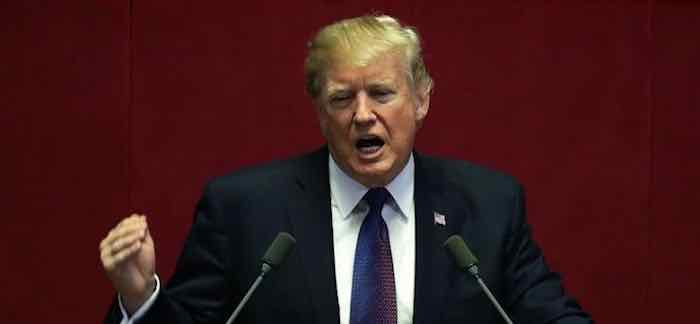By Claudia Rosett -- PJ Media——Bio and Archives--November 9, 2017
American Politics, News | CFP Comments | Reader Friendly | Subscribe | Email Us
 Wow. President Trump wrapped up his visit to South Korea with a speech square in the tradition of President Ronald Reagan. It's not just that he talked about the long conflict on the Korean peninsula: the "dazzling light" of South Korea versus the "impenetrable darkness" of the North, the glories of freedom versus the toll of tyranny, the line that separates them just north of Seoul, and America's commitment to defending it. What made this a landmark speech is that Trump explained, vividly and in detail, why the internal depravities of the North Korean regime are intimately entwined with its nuclear program and its threats to South Korea and the rest of the Free World. Coming from an American president, this was a speech the world has long needed to hear.
Wow. President Trump wrapped up his visit to South Korea with a speech square in the tradition of President Ronald Reagan. It's not just that he talked about the long conflict on the Korean peninsula: the "dazzling light" of South Korea versus the "impenetrable darkness" of the North, the glories of freedom versus the toll of tyranny, the line that separates them just north of Seoul, and America's commitment to defending it. What made this a landmark speech is that Trump explained, vividly and in detail, why the internal depravities of the North Korean regime are intimately entwined with its nuclear program and its threats to South Korea and the rest of the Free World. Coming from an American president, this was a speech the world has long needed to hear.
"North Korea is a country ruled by a cult. At the center of this military cult is a deranged belief in the leader's destiny to rule as parent-protector over a conquered peninsula and an enslaved Korean people."He then laid out before South Korea's Assembly exactly why North Korea's regime regards their thriving, democratic nation as a threat:
"The more successful South Korea becomes, the more decisively you discredit the dark fantasy at the heart of the North Korean regime. In this way, the very existence of a thriving South Korean republic threatens the very survival of the North Korean dictatorship."Contrasting, in yet more detail, the freedom and prosperity of South Korea with the misery and destitution of North Korea, Trump listed some of North Korea's hundreds of attacks over the decades on Americans and South Koreans, noting: "All the while, the regime has pursued nuclear weapons with the deluded hope that it could blackmail its way to the ultimate objective." That objective, as his speech makes clear, entails eliminating the free Korean republic in the South, and enslaving the entire Korean peninsula. That would complete the takeover attempted by the surprise military invasion by the North in 1950, under Kim Jong Un's grandfather, founding tyrant Kim Il Sung. Trump stressed that America will not let that happen, and warned North Korea not to underestimate the United States or his administration -- which he said is "very different" from those before. He said that for North Korea to interpret past U.S. restraint as "weakness" would be a "fatal miscalculation." Underscoring a creed of "peace through strength," he pointed out the presence near the Korean peninsula of American nuclear submarines, and "the three largest aircraft carriers in the world, loaded to the maximum with magnificent F-35 and F-18 fighter jets."
Support Canada Free Press

"America does not seek conflict or confrontation, but we will never run from it. History is filled with discarded regimes that have foolishly tested America's resolve."There was plenty more to the speech, and in the rarefied realms of the U.S. foreign policy elite and much of the press, the entire text will likely be picked apart as well short of a clear solution, too threatening, or perhaps attacked as simply imbued with too much Trump -- including his mention of a golf tournament, won this year by a South Korean, at the Trump National Golf Club in Bedminster, New Jersey. As Trump now begins his visit to China, on the next leg of his five-country trip to Asia, the end game with North Korea remains highly uncertain and loaded with dangers. It will take more than words -- however clarifying -- to end the rising threat from North Korea. But as far as words can matter, this was the presidential speech about North Korea that has been needed for many years. It was delivered in-your-face to North Korea, from Seoul. It was brimming with truth about North Korea, and the history, character and motivations of its depraved regime, right down to Trump's message to Kim Jong Un (and any other North Koreans who might have the ability to tune in) that North Korea today is not the "paradise" promised by his grandfather, but "a hell that no person deserves." If Kim Jong Un does not listen, we can hope that others will -- in the circles close to Kim in Pyongyang, in South Korea, and around the world. After a series of feckless and failed U.S.-led nuclear deals with North Korea stretching back more than two decades, topped off by the "strategic patience" with which Obama shrugged off a literally soaring nuclear threat, Trump just lit up the landscape by telling it like it really is. That's a vital move in the direction of finding a solution to the ticking bomb that is North Korea. Claudia Rosett is Foreign Policy Fellow with the Independent Women’s Forum, and author of the Encounter Books Broadside, What To Do About the UN.
View Comments
Ms. Rosett, a Foreign Policy Fellow with the Independent Women’s Forum, a columnist of Forbes and a blogger for PJMedia, is a contributing editor of The New York Sun.